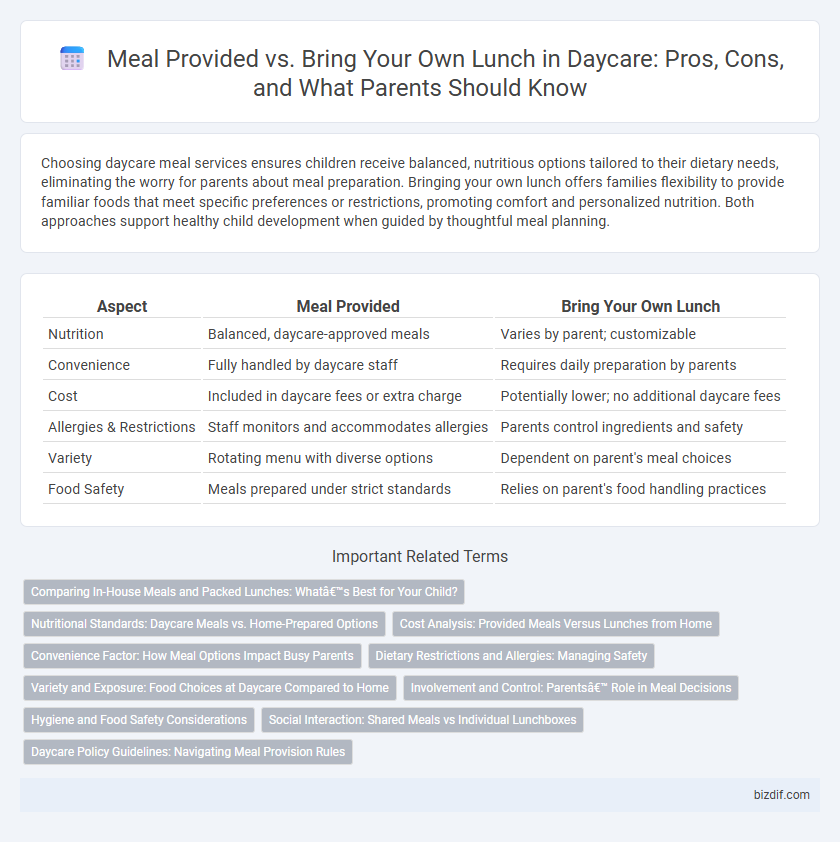Choosing daycare meal services ensures children receive balanced, nutritious options tailored to their dietary needs, eliminating the worry for parents about meal preparation. Bringing your own lunch offers families flexibility to provide familiar foods that meet specific preferences or restrictions, promoting comfort and personalized nutrition. Both approaches support healthy child development when guided by thoughtful meal planning.
Table of Comparison
| Aspect | Meal Provided | Bring Your Own Lunch |
|---|---|---|
| Nutrition | Balanced, daycare-approved meals | Varies by parent; customizable |
| Convenience | Fully handled by daycare staff | Requires daily preparation by parents |
| Cost | Included in daycare fees or extra charge | Potentially lower; no additional daycare fees |
| Allergies & Restrictions | Staff monitors and accommodates allergies | Parents control ingredients and safety |
| Variety | Rotating menu with diverse options | Dependent on parent's meal choices |
| Food Safety | Meals prepared under strict standards | Relies on parent's food handling practices |
Comparing In-House Meals and Packed Lunches: What’s Best for Your Child?
In-house meals at daycare centers are often designed by nutritionists to meet children's dietary needs, ensuring balanced portions of proteins, fruits, and vegetables. Packed lunches offer parents complete control over ingredients, accommodating specific allergies, preferences, or cultural diets, but risk lacking nutritional variety if not carefully planned. Evaluating the quality, convenience, and dietary customization between in-house meals and packed lunches helps parents make informed decisions for their child's health and mealtime enjoyment.
Nutritional Standards: Daycare Meals vs. Home-Prepared Options
Daycare meals are designed to meet specific nutritional standards set by regulatory authorities, ensuring children receive balanced portions of proteins, fruits, vegetables, and whole grains. Home-prepared lunches allow for personalized dietary preferences and restrictions but may vary widely in nutrient density and variety. Consistent monitoring of nutrient intake is essential when relying on home-packed meals to support optimal childhood growth and development.
Cost Analysis: Provided Meals Versus Lunches from Home
Daycare meal programs often balance cost efficiency with nutritional quality, where provided meals consolidate bulk purchasing and staffing but may include service fees embedded in tuition. Bringing lunches from home shifts the financial responsibility to parents, potentially reducing daycare costs but increasing household grocery expenses and time spent preparing food. Comparing these options requires evaluating not only direct monetary costs but also factors like food waste, meal variety, and dietary restrictions adherence.
Convenience Factor: How Meal Options Impact Busy Parents
Choosing daycare meal options affects convenience for busy parents significantly; provided meals eliminate the daily task of packing lunches, saving valuable time during hectic mornings. Daycares offering nutritious, ready-to-serve meals reduce parents' stress and ensure consistent, balanced nutrition for children. Bringing your own lunch offers control over dietary preferences but requires meticulous preparation, which can add to parental time constraints.
Dietary Restrictions and Allergies: Managing Safety
Daycares that provide meals can ensure strict adherence to dietary restrictions and allergy management by preparing allergen-free menus under professional supervision, minimizing cross-contamination risks. Allowing children to bring their own lunch requires careful communication between parents and staff to guarantee safe handling and storage, preventing exposure to allergens. Implementing clear protocols and training staff on allergy awareness boosts safety and supports families managing specific dietary needs.
Variety and Exposure: Food Choices at Daycare Compared to Home
Daycare meal programs often offer a wider variety of foods compared to home-packed lunches, introducing children to diverse flavors and nutritional options that support balanced eating habits. Exposure to meals prepared by professionals can encourage children to try new foods and develop healthier palates. Home lunches may lack this variety, limiting children's experience with different cuisines and food textures crucial for their dietary development.
Involvement and Control: Parents’ Role in Meal Decisions
Parents play a crucial role in meal decisions at daycare by balancing involvement and control through choices between provided meals and bringing their own lunch. Opting to bring packed lunches allows parents complete control over nutritional content, catering to specific dietary needs and preferences. Conversely, choosing daycare-provided meals involves trusting established nutrition standards while offering opportunities for parents to communicate dietary restrictions and preferences with childcare providers.
Hygiene and Food Safety Considerations
Daycares providing meals ensure strict hygiene protocols, including temperature-controlled storage and allergen management, reducing the risk of foodborne illnesses. Parents who bring their own lunches must follow daycare guidelines to maintain food safety, such as using insulated containers and avoiding perishable items. Proper handling and storage practices are critical in both scenarios to protect children's health and prevent contamination.
Social Interaction: Shared Meals vs Individual Lunchboxes
Shared meals in daycare settings promote social interaction by encouraging children to engage in conversations, develop language skills, and build friendships around a common table. Meals provided by the daycare allow for a cohesive group experience, fostering inclusion and cooperation among peers. In contrast, individual lunchboxes can sometimes lead to isolated eating habits, limiting opportunities for children to connect and share mealtime experiences.
Daycare Policy Guidelines: Navigating Meal Provision Rules
Daycare policies on meal provision vary, with some centers offering nutritious, balanced meals prepared on-site, ensuring compliance with dietary standards and allergen regulations. Parents must review guidelines carefully, as certain daycares mandate bringing your own lunch to accommodate specific dietary needs or preferences. Understanding these rules helps parents plan effectively and supports the daycare's commitment to child health and safety.
Meal provided vs Bring your own lunch Infographic

 bizdif.com
bizdif.com